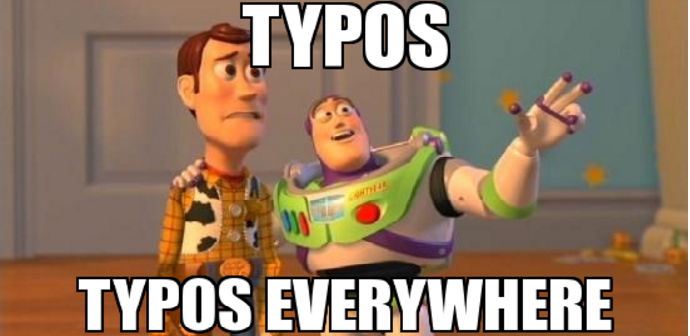THE IRATE READER, THE DREADED TYPO, AND THE MYTH OF THE INCOMPETENT SELF-PUBLISHED AUTHOR — OR TRADITIONALLY PUBLISHED AUTHORS AREN’T PERFECT, EITHER

Hi, everyone. The air has changed in Southern California. The heat of late summer that drives my breath back into my lungs, has suddenly dissolved into a cool, clear breeze. It feels as if the world has come back into focus. I’ve broken out the Pumpkin Spice candles and the Gingerbread tea and wrapped the house in garlands of silk autumn leaves that I bought on sale at Michael’s because the trees in SoCal are not going to provide real ones. (Sigh!)
Our new puppy has come home. Summer Moon. She’s an English Golden Retriever. She isn’t golden, at all, of course. She’s as white as the full moon. Hence her name. “Moon” because of her color. “Summer” because she came home in late summer. She looks like an angel but is full of mischief. Her big brother, Rhythm, doesn’t quite know what to make of her. She has two speeds: “on” and “off.” And when she’s “on,” nothing in the house is safe from her tiny teeth, including Rhythm’s tail.

I’ve just finished uploading the corrected manuscripts for Mirror, Mirror, so now the paperback version will soon be available on Amazon. I used three proofreaders this time for the manuscript, and the last one read every one of the 120,710 words aloud plus punctuation marks. When I was an editor/proofreader, before I went to law school, this is the way we read the final version of manuscripts because we had the best chance of catching errors by reading aloud. So this time I thought I was safe from complaints about TYPOS. But alas!
About a week after Mirror, Mirror had been published as an ebook, I got the message from Irate Reader. “I like your book BUT—” Insert drum roll, thunder and lightning. “BUT it has TYPOS!!” No hint of what those TYPOS might be. I felt as if someone had sent one of my children home from school with a message pinned on his/her back, “Your child has CHICKEN POX! Your HORRIBLE EXCUSE for a Mother!”
My first reaction was to protest. Three proofreaders, I told her! Every word and punctuation mark scrutinized, aloud! But, alas! Irate Reader was unrelenting. Her next email cut even deeper. She called me, “UNPROFESSIONAL!” I had a big Breneˊ Brown moment after that. If you don’t know about Breneˊ Brown, she describes herself as a “shame researcher.” She is a professor at the University of Houston, who has written on the topic of shame and how it affects our lives. When Irate Reader’s wrath descended upon me, I had been reading Dr. Brown’s book, I Thought It Was Just Me (But It isn’t). And I knew that the paralyzing, sick feeling in the pit of my stomach was shame.
Despite my best intentions, I’d humiliated myself in public, by telling a story that I had hoped many people would enjoy. I wasn’t a woman with three post-graduate degrees, all cum laude. I was an UNPROFESSIONAL with TYPOS. Sort of like a careless excuse for a mom who’d sent her kid to school with CHICKENPOX and now the child had to be sent back to the incompetent parent.
I was deeply hurt by having my imperfections hurled in my face. I thought about taking the book down. FOREVER. I’d worked so hard on it every night for six long months. I’d worked on it on the nights when my heart had been breaking because my Golden Retriever Melody was dying. I’d worked on it on the nights when I’d been so tired that I couldn’t see the page because I’d been writing for the courts of appeal all day. But I had kept on going because I had thought my characters were telling me a story that would entertain and touch hearts. And I’d launched that story into the world after so much time and care, happy and proud, and hoping to find readers with hearts to be touched. But, now, within a week of its publication, it had been deemed worthless. TYPOS! UNPROFESSIONAL! All because I’m not, and never will be, PERFECT.
“The quest for perfection is exhausting and unrelenting.” Breneˊ Brown
Since self-publishing has become an option for writers, a myth has grown up that self-published writers are the only ones who launch books with typos. That was the gist of Irate Reader’s “UNPROFESSIONAL” (SNIFF) label. I got a does (dose, get it?) of this prejudice early on when I published my first novel, Dance for A Dead Princess. At some point, one of the TOP 100 AMAZON REVIEWERS got her 3-star hands on it. But she didn’t stop at 3 grudging stars. She went straight to the top, to THE ZON itself and advised that I was illiterate. Why, there were whole sections of the book that hadn’t even been spellchecked! REALLY! THE NERVE!
Turns out, Ms. TOP 100 didn’t understand that the Tudor diary of Thomas, Carey, the First Duke of Burnham, is written in my approximation of Tudor English. That means the way Shakespeare wrote and spelled. THE ZON backed way down after I explained the development of the English language and added, “Bet you wouldn’t have sent a QUALITY CONTROL NOTICE to Random House!”
So, just in case anyone else out there besides Irate Reader and Ms.Top 100 thinks that TYPO’s are the exclusive manifestation of the ignorance of self-published writers and that all the brains belong to the traditionally published ones, let me offer the following examples of TYPOS from novels you will recognize (and by the way, editions of these WITH TYPOS are worth hundreds of dollars)
Theodore Dreiser, An American Tragedy
Characters are referred to as “harmoniously abandoning themselves to the rhythm of the music—like two small chips being tossed about on a rough but friendly sea.”
Pearl S. Buck, The Good Earth
A wall against which people set up their huts being described as “It stretched out long and grey and very high, and against the base the small mat sheds clung like flees to a dog’s back.” Editions of the book that include the misspelling can go for as much as $9500.
J.K. Rowling, Harry Potter and the Philosopher’s Stone
Some copies of this book are valued at a small fortune for this reason. On page 53, in a list of school supplies that young wizards are expected to bring to Hogwarts: “1 wand” is listed at both the beginning and at the end. That said, the typo did reappear in a few later printings even after it was caught in the second round, so it’s only the true first editions that are worth beaucoup bucks. [This example illustrates just how hard these pesky little TYPOS are to eliminate even after they have been found.]
“The Wicked Bible”
The1631 edition of the King James Bible by Robert Baker and Martin Lucas included an accidental new twist on the 7th Commandment, informing readers that “Thou shalt commit adultery.” This managed to incense both King Charles I and the Archbishop of Canterbury—its publishers were hauled into court and fined £300 (a little over $57,000 in today’s U.S. dollars) for the oversight and they had their printing license revoked. Most of the copies were subsequently burned, and the book picked up the sobriquet “The Wicked Bible” or “The Sinners’ Bible.” Only about 10 copies remain today—one was put up for sale by British auction house Bonhams just last year.
As for me, I went back over the book one more time. I found some commas that only I would notice were out of place. There were a couple of repeated words, a few line breaks, and an “it” for an “in.” One very kind reader wrote to tell me that my dates were wrong at the beginning of one of the chapters. (Bless her.)
So the corrected version is up. I’m sure there are more TYPOS out there because perfection is unattainable for me. But here’s the deal. If you find any more and email me with the error, its location, and your address, I’ll send you a Starbuck’s gift card for a cup of coffee. And I’ll send you my greatest thanks for liking my stories and for being my friend. Even though I’m not perfect.




